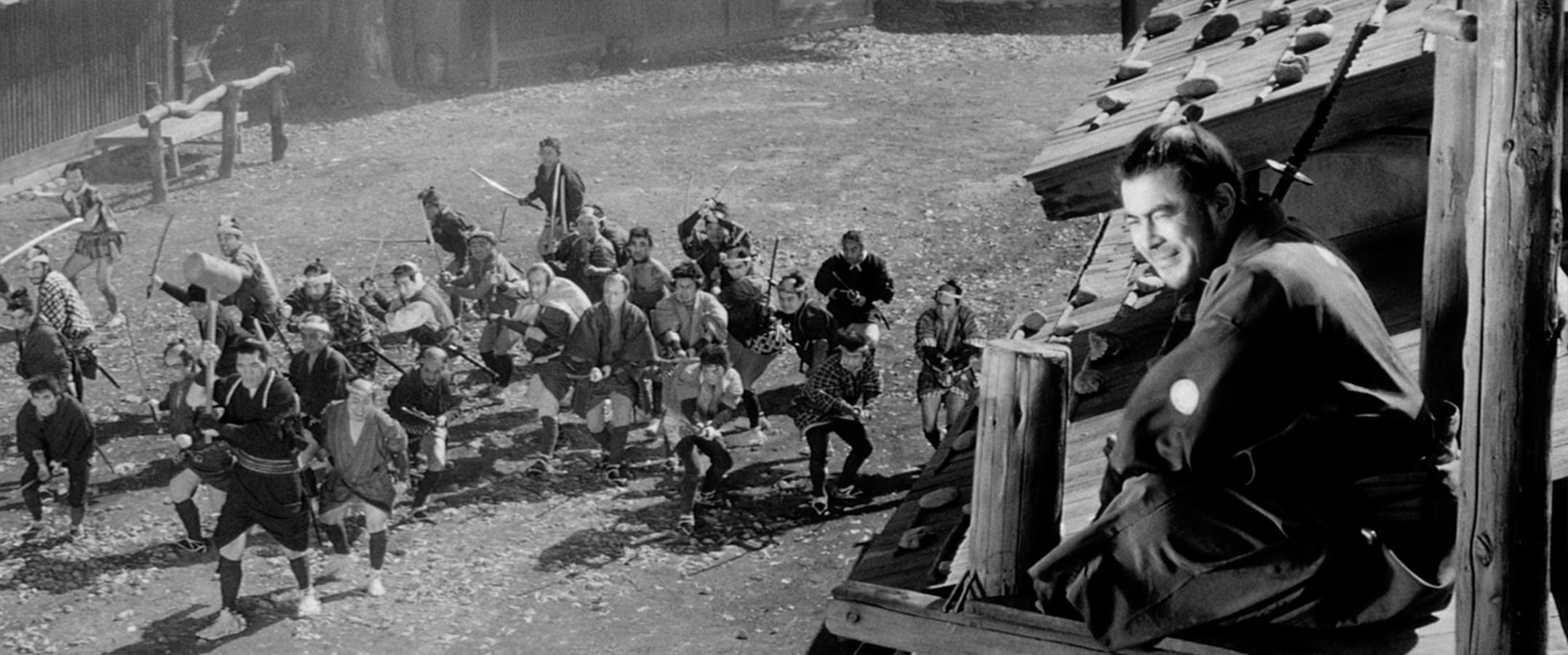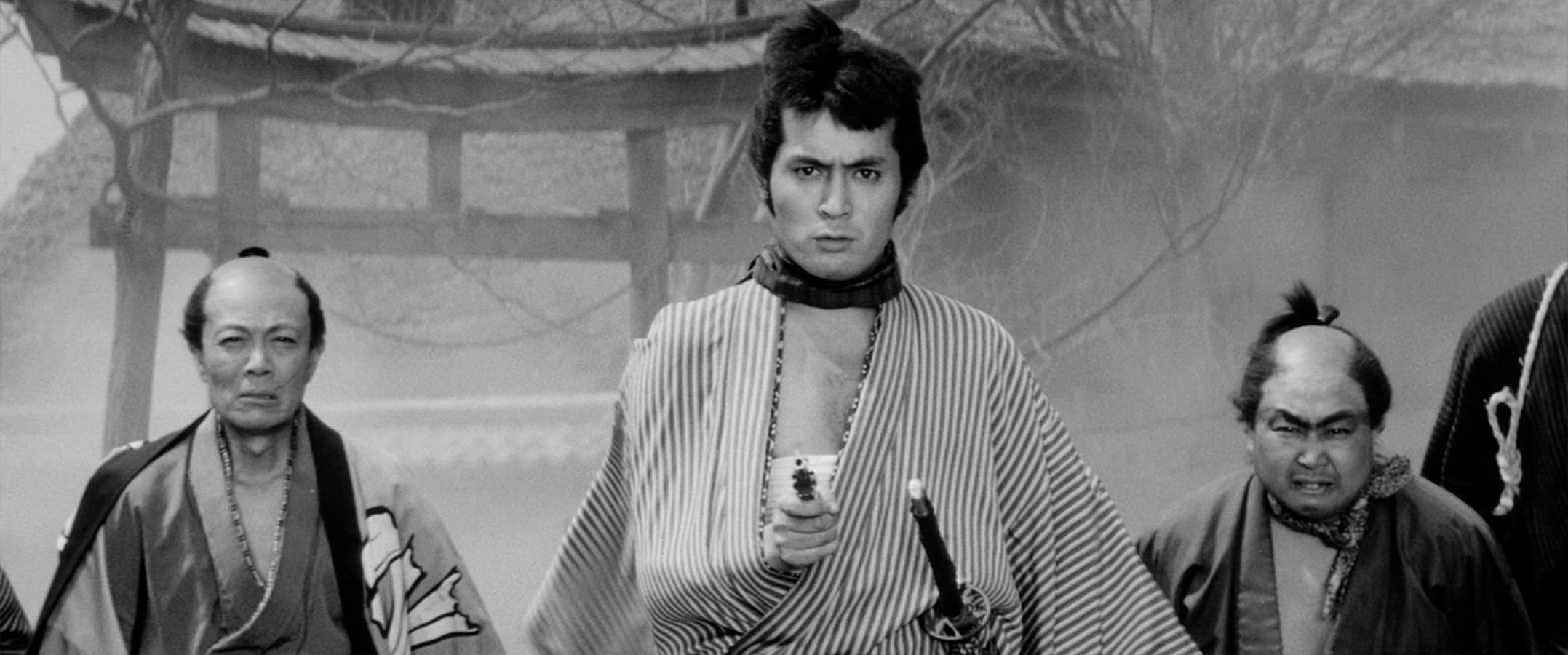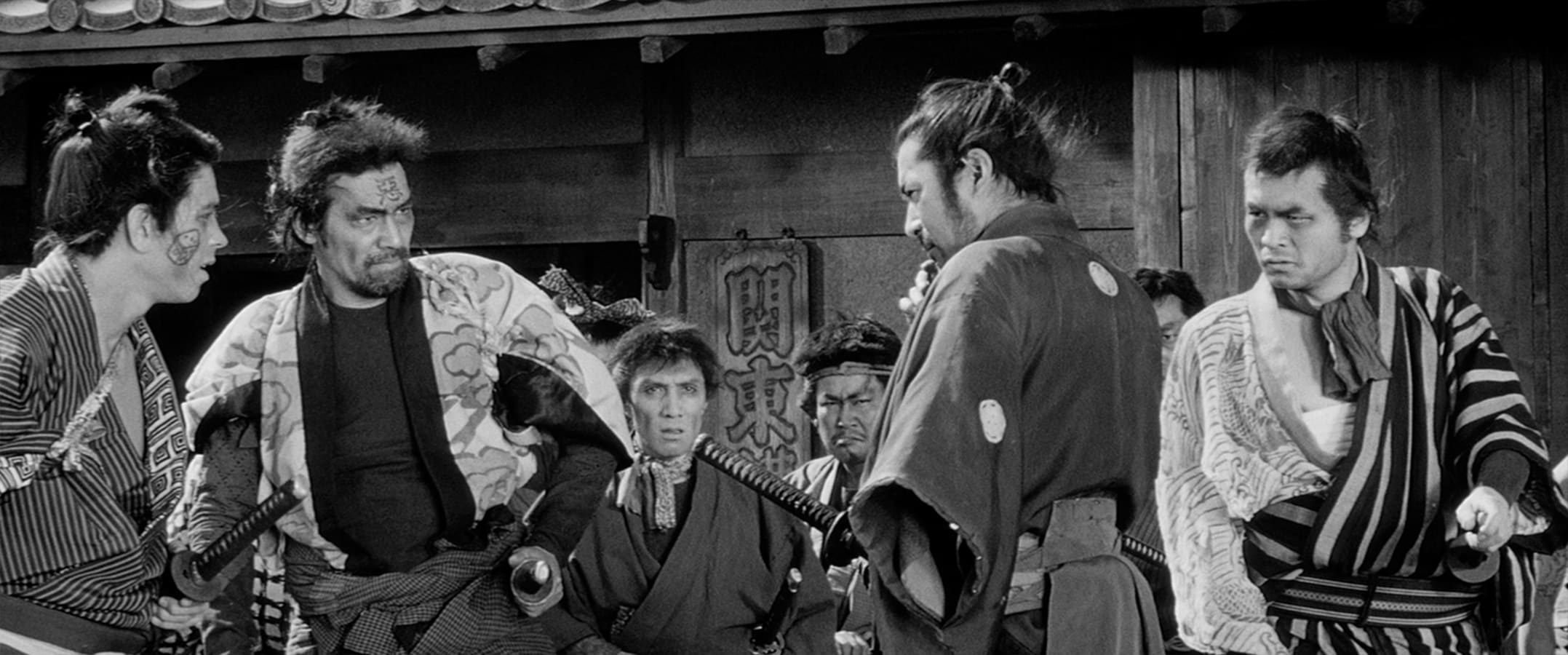
Picture the setting: A lone samurai wanders the countryside. He’s dirty and disheveled, and he doesn’t seem to care much about where he’s going or what he’ll find when he gets there. Seemingly at random, he winds up in a town whose streets are empty save for a dog trotting down the muddy path carrying a human hand in its mouth. Something is clearly wrong with this place, and as our nameless hero discovers what it is, the body count will have already started climbing.
Akira Kurosawa’s Yojimbo is no ordinary movie. Like much of the prolific director’s work, it derives much of its visual panache and fatalistic themes from Hollywood Westerns, pulp novels, and even William Shakespeare, but somehow remains quintessentially Japanese. Kurosawa had a knack for taking what was best from highly-regarded works of western cinema and literature and transferring them to a feudal Japanese setting, where, as it turns out, the windswept vistas of American Westerns and the dark violence of film noir found an easy home.
In turn, Kurosawa’s films were often cyclical in their impact. The regard he held for directors like John Ford and authors like Dashiell Hammett is key to understanding his visual style and mode of storytelling, but the return impact his films had on western filmmakers cannot be understated. Kurosawa films like Rashomon, Seven Samurai, The Hidden Fortress, Yojimbo, and others would go on to change not only how cinematic stories could be told, but would inspire a handful of bona fide remakes as well.

Seven Samurai became the John Sturges classic The Magnificent Seven, while the basic plot and characters found in The Hidden Fortress would become the foundation Geroge Lucas would build his Star Wars franchise on. Yojimbo, of course, would famously (and illegally) become A Fistful of Dollars, the first in Italian director Sergio Leone’s “Dollars Trilogy,” starring a young Clint Eastwood (plus Walter Hill’s sub-par 1996 effort Last Man Standing, starring Bruce Willis, but who’s counting?).
When watching Yojimbo, it’s very easy to imagine it remade as a more traditional Western film. It has all the tell-tale genre tropes we’ve grown to accept and enjoy in our Westerns, from the soft-spoken but highly skilled mystery hero to the gangs of outlaws, all the way to the desolate setting and final showdown with the evil boss. But what makes Yojimbo so fascinating in this regard is that Kurosawa, to a large extent, was helping to create these genre tropes, not simply adhere to them.
Without Toshiro Mifune’s brilliant turn as the wandering rōnin Kuwabatake Sanjuro (which literally translates to “30-year-old mulberry field,” the random response given when someone insists on knowing his name), there is no Clint Eastwood as the “Man with No Name.” The idea that a Japanese director and actor would team up to popularize one of the Western genre’s most long-standing archetypes is simply fascinating to me.

Yet, despite the western influence on its visual and genre aspects, Yojimbo remains a very Japanese film whose themes specifically critique post-war life. The world of Yojimbo is particularly corrupt, and Kurosawa uses this corruption to mirror what he was seeing in Japan as western capitalists began carving up the island nation in the years following World War II.
In addition, the appearance of an American Smith & Wesson revolver in the hands of an unhinged maniac (Tatsuya Nakadai) could be interpreted as a comment on American weaponry changing the course of Japanese history (a terrifying notion that must have been on every Japanese person’s mind in post-war years) or simply that not all change is good change, especially when it comes quickly and at the hands of those who don’t yet understand its ramifications.
Wrap all of this weight up into a darkly comedic and tightly-woven 110 minutes with a wonderfully jazzy and surprisingly upbeat score by Masaru Sato, and Yojimbo becomes very nearly a perfect film. Toshiro Mifune, already an international star thanks to Rashomon and Seven Samurai, is nothing short of spectacular in every single frame. Everything from his mannerisms, his gruff look, his movements, and his dark wit are the stuff not only Western genre archetypes are made from, but the stuff action stars in general moving forward would be made from as well. Kurosawa and Mifune would make sixteen films together between 1948 (Drunken Angel) and 1965 (Red Beard), but if you have to start somewhere when tackling this legendary collaboration, you can’t go wrong with Yojimbo.

Japan • 1961 • 110 minutes • Black & White • 2:35:1 • Japanese • Spine #52
Criterion Special Features Include
- New, restored high-definition digital transfer, with uncompressed monaural soundtrack on the Blu-ray edition
- Optional Dolby Digital 3.0 soundtrack, preserving the original Perspecta simulated-stereo effects (DTS-HD Master Audio on the Blu-ray edition)
- Audio commentary by film historian and Kurosawa scholar Stephen Prince
- A 45-minute documentary on the making of Yojimbo, created as part of the Toho Masterworks series Akira Kurosawa: It Is Wonderful to Create, featuring Kurosawa, actor Tatsuya Nakadai, production designer Yoshiro Muraki, and longtime Kurosawa collaborator Teruyo Nogami
- Theatrical teaser and trailer
- Stills gallery of behind-the-scenes photos
- New and improved English subtitle translation
- PLUS: A booklet featuring a new essay by film scholar Alexander Sesonske and comments from Kurosawa and his cast and crew
James is a writer, record collector, wrestling nerd, and tabletop gamer living with his family in Asheville, North Carolina. He is a member of the Southeastern Film Critics Association, the North Carolina Film Critics Association, and contributes to The Daily Orca, Razorcake Magazine, Mountain Xpress, and Asheville Movies.